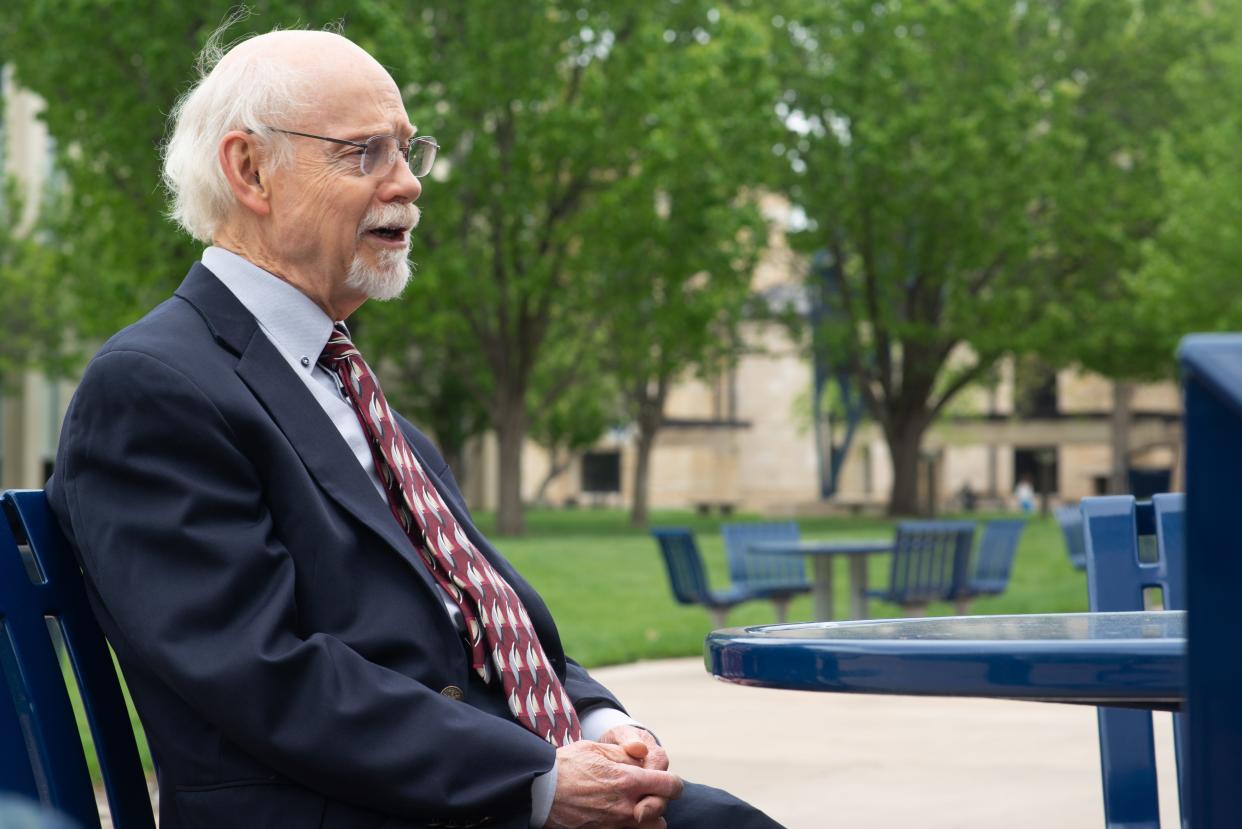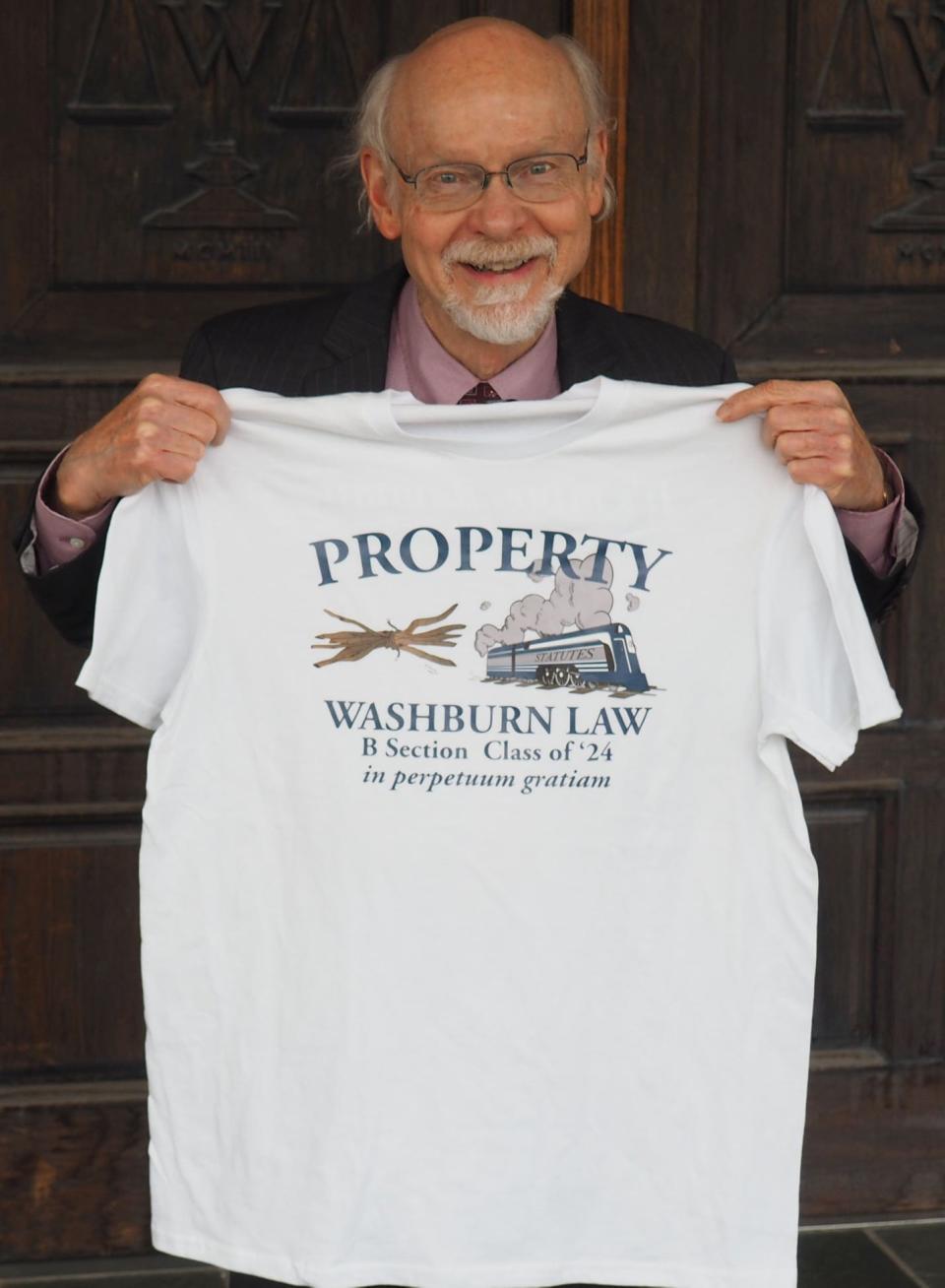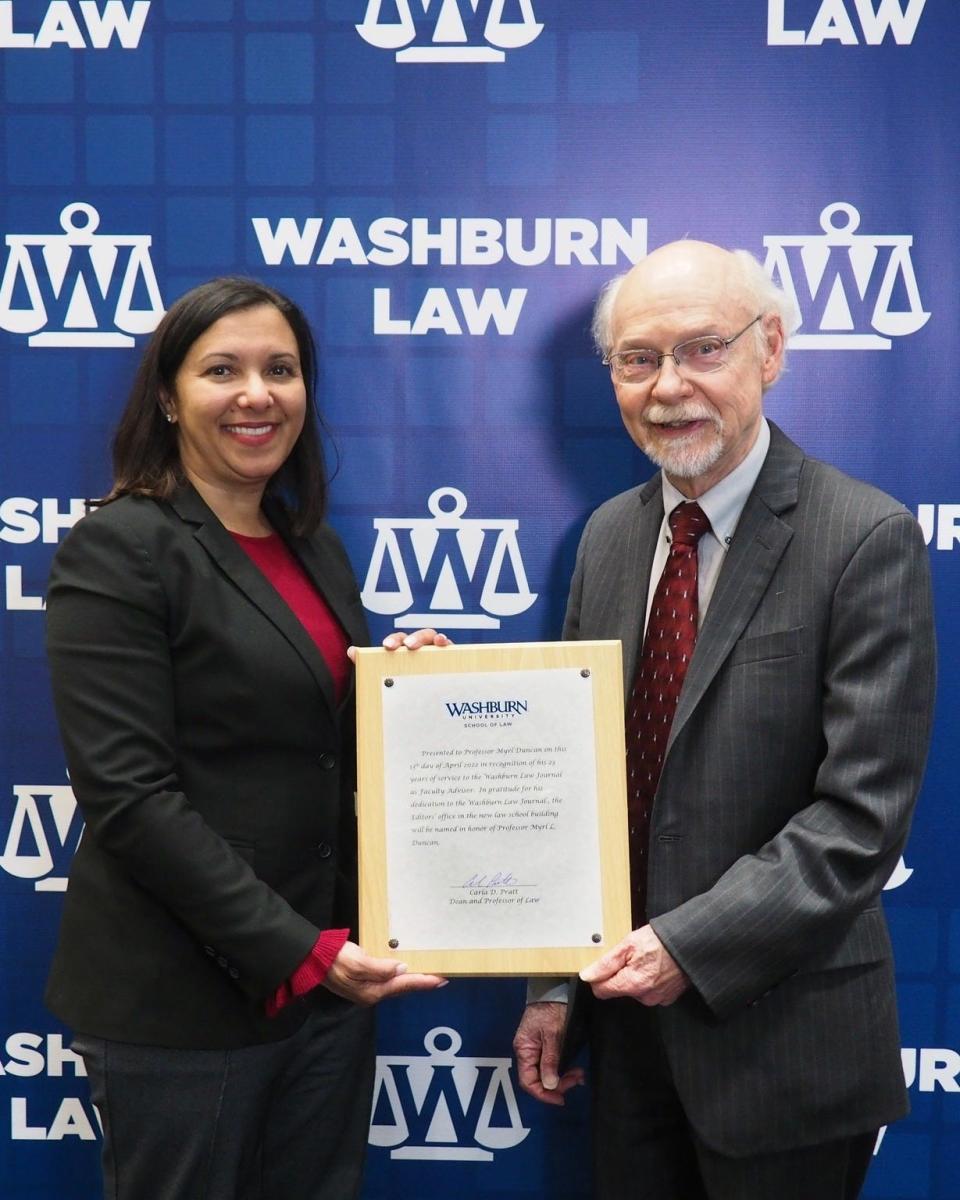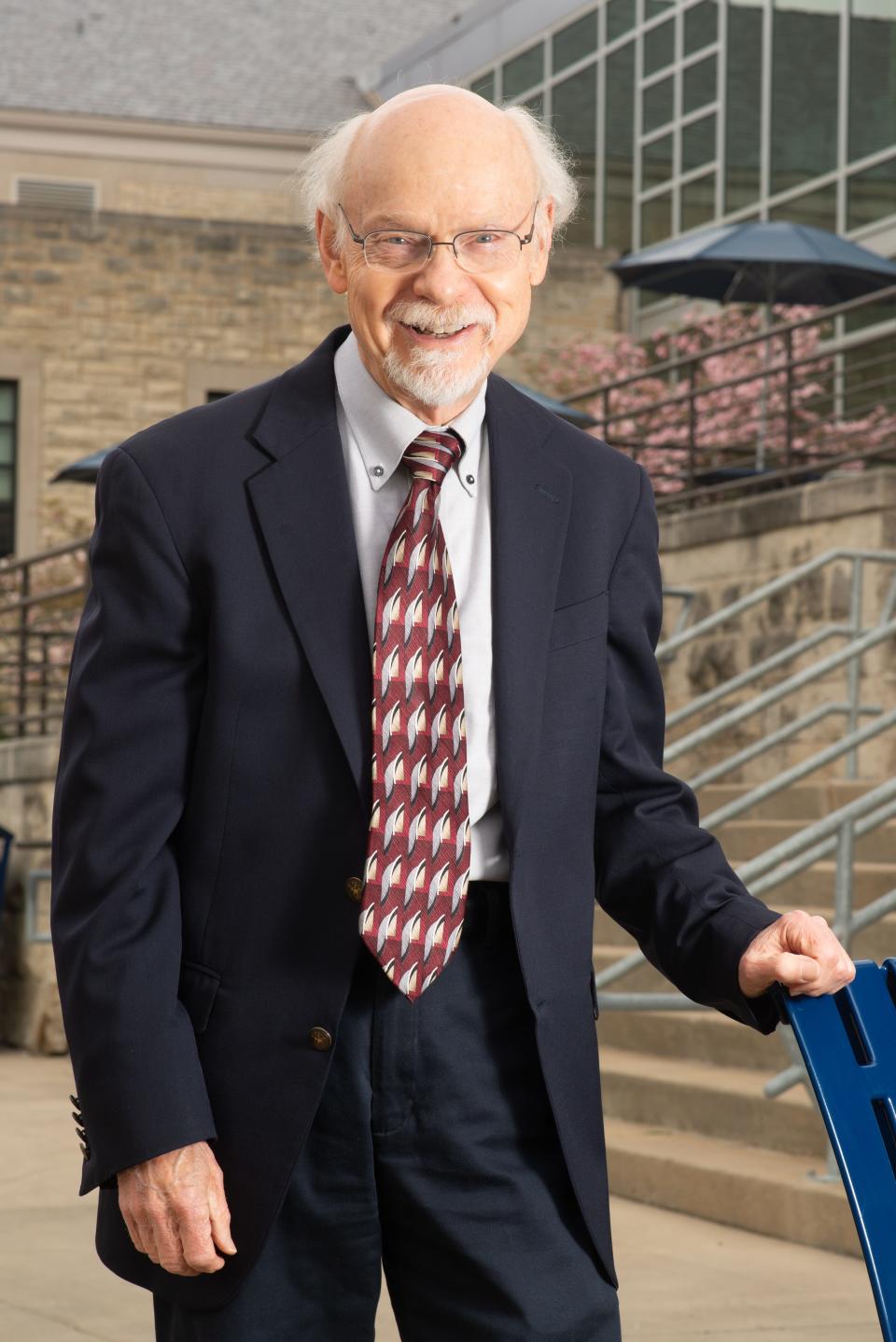What Washburn's Myrl Duncan learned about law after 45 years teaching it

Myrl Duncan had planned to save the world, but then he went to law school.
A self-described child of the 1960s, Duncan's mindset was molded by the generation of civil rights, opposition to the Vietnam War and saving the environment.
After he graduated from the University of Kansas in 1970, the Paola native set off to Georgetown University's Law Center to become an environmental lawyer, with designs on joining the political world and making his splash there.
"I think I went to law school thinking I would save the world, like a lot of my generation did," Duncan joked. "We quickly discovered nobody's going to save the world all by themselves, and the big cases that really have a monumental difference don't come around every day."
After he earned his juris doctorate from Georgetown, he decided to return to Kansas, where he found a position on the Washburn University School of Law faculty.
It ended up being his home for the next 45 years.
As Duncan prepares to retire, he reflected back on his initial political aspirations, and the decision he made to ultimately go into academia, never quite "single-handedly saving the world."
But after 45 years as an educator, his friends and colleagues say the best measure of Duncan's effect on this planet is more appropriately in the thousands of student lives he touched as a lecturer, adviser and beacon of professionalism as an environmental law professor at Washburn Law.
Duncan is an environmental law teacher and an environmentalist
When he first came back to the state in 1975, Duncan did join the world of political realm, at least for a couple years and if tangentially, as a Kansas Supreme Court clerk.
As a clerk, though, he got to thinking more closely on a revelation that he'd had as a law student — that being a lawyer could and should be more than arguing big cases, crafting monumental legislation or helping craft legal precedents.
It could be, at its heart, simply about giving big help in little ways.
"(Being a lawyer) is a way to help people, and that certificate on the wall could give me the chance to do some good things for people," he said. "You toss your rock across the pond and see where the ripples go. That's kind of the way I've felt about teaching. You skip that rock, and you don't know where the ripples are gonna go."
The ink had barely dried on the Clean Water Act of 1972 when Duncan was a Georgetown law student, but it was in environmental and natural resource law that he found a niche, especially as a Washburn School of Law professor.
More: How some Topeka-area students celebrated Earth Day 2022
Since his early days as a professor, environmental law has only gotten more sophisticated, if complicated, he said.
"Environmental law is this big statute that I think students often don't understand when they're first coming into my class," Duncan said. "Maybe they want to save the world, too, but they run into the brick wall of these big, federal statutes."
What he imparts on those students, then, is that none of them can or should have to solve these big environmental issues. Rather, they can play a role in broader, on-the-ground efforts to combat climate change.
It's almost a call back to Duncan's own beginnings in law as his students now come from what could be called "the climate change generation."
"No single individual is going to save the world," Duncan said. "But there are good organizations out there doing it, and they need good lawyers, too. No individual can do too much, but they can get on the train moving in the right direction."
Duncan has been an 'old school' professor and law journal adviser

Duncan is "old school," in as literal a sense of the term possible. He much prefers the environment of a physical classroom, and he's glad to leave higher education's transition to more hybrid, online-style classes to younger colleagues.
In addition to teaching environmental law classes, many of Washburn's law school graduates likely remember Duncan from his property law class.
"That's one of the first courses that students will take, and through it, he's been able to set a tone of professionalism for the students as they begin their careers," said associate dean for academic affairs John Francis.
For the past 23 years, Duncan has also served as the longest-tenured faculty adviser to the student-run Washburn Law Journal. In that role, he has worked closely with student editors to help them build a nationally renowned law journal, said James Concannon, a former Washburn law professor and once-dean of the school.
"That's his great legacy," said Concannon, who himself retired in 2019 after 48 years at the school. "It's a student-edited publication, but it attracts not just student authors but articles from leading scholars around the country who publish on important legal issues. He's had such a lasting impact on the quality of work that gets published in the journal."
More: Take a look at designs for Washburn University's new School of Law building
In Duncan's recognition, the law journal announced in April that its editor-in-chief office will be named after the long-tenured adviser.
"That's been his baby," said Linda Elrod, a fellow law school faculty member. "He got to know the editors and helped them hone their writing. ... His biggest impact has been through his work and relationships with students. That's where he made a differences made, day by day, one by one, student by student."
Then there's the actual "old school" itself in the Washburn School of Law's soon-to-be-replaced home. Duncan joined the faculty in the building's first decade after it was built in 1969. When university administrators saw a need for more space in 1988, Duncan chaired a committee that ultimately added 30,000 square feet to the old building.
He'll leave the school just as it prepares to move to a new $35 million law school building across campus, but Duncan doesn't mind missing the chance for a new office.
"This building is my home," he said.
Kansas Supreme Court justice: Duncan encourages, demands excellence

In his role overseeing thousands of law students over more than four decades, Duncan helped establish a reputation for freshly minted Washburn law graduates as being among the hardest-working and detail-focused lawyers, Concannon said.
"He's always expected the best of his students," said Concannon. "He wouldn't let them get away with sloppy reading of cases or have statutes, which would make them do the hard work that they ultimately have to do in practice."
Kansas Supreme Court Justice Evelyn Wilson still remembers walking into Duncan's Legal Research and Writing Class over four decades ago.
She came to know Duncan as a professor who would prepare rigorously for each of his classes and held the same expectation for his students.
More: Washburn Law dean to step down from post. Carla Pratt is the 2nd administrator to leave this spring.
"He wanted us to figure out how to be good lawyers," she said. "He wasn't going to just feed us the answers or tell us what we needed to do to learn his subjects. He pushed us and challenged us to be the best students we could be."
Wilson would later go on to be an adjunct on the Washburn School of Law faculty for a few years before becoming a judge. Gov. Laura Kelly later appointed her to the Kansas Supreme Court in 2019.
Throughout that time, Wilson came to call Duncan both a colleague and close friend. She said many lawyers across Kansas and even the U.S. owe their personal and professional successes to the environmental law professor.
"He's been someone who doesn't just demand excellence of himself," Wilson said, "but it's been important to him to encourage excellence in his students — to encourage them to keep trying to do better and to perform at the highest levels of their profession.
"That level of honor, integrity and professionalism is something that is invaluable in attorneys and judges that have seen that and learned that from him."
What Myrl Duncan learned about law from 45 years teaching it

"Law, to me, is a great big canvas," Duncan said. "It's religion. It's philosophy. It's all of the above, and the law simply hovers above it, if you will. It incorporates all those other disciplines. Some people call it 'the Queen of the humanities,' and that's not a bad term."
The key to teaching law school students, then, has been in reducing big legal concepts and statutes to the fundamental principles and values that underlie them.
If there's anything he hopes his thousands of students have learned from him, it's some sense of the fact that law is a human endeavor.
"It's not and should not be a win-at-all cost endeavor," he said. "We're all human beings, we all have emotions and vulnerabilities and what have you. Everybody needs to be treated as a human being, and law is about understanding that it's a very human activity we're engaged in."
After he fully retires at the end of this school year, Duncan said he's looking forward to seeing a lot more of the world he's been so intent on saving.
More: Longtime Washburn University president Jerry Farley announces retirement
An avid hiker, he's seen much of it already — including a trip a decade ago to hike the Himalayas. Australia is on his retirement bucket list, as well as the Balkans and Croatia.
"There's new places (on my list), but plenty of old places too," Duncan said. "I'm probably happiest with a pair of hiking boots somewhere on the trail."
The best way to learn about something is to teach it, Duncan said, so at the end of 45 years at a School of Law, he's probably learned a lot of it, he joked.
At the heart of practicing and teaching law, though, are critical thinking and problem-solving skills — all in the pursuit of helping people.
"I learned it really is about people," he said. "It's about students, and the people they interact with. It's a people profession, so we can't disembody it in a set of rules. We have rules, but they're there to serve people. I've believed that for a long time, and I always will."
Rafael Garcia is an education reporter for the Topeka Capital-Journal. He can be reached at rgarcia@cjonline.com. Follow him on Twitter at @byRafaelGarcia.
This article originally appeared on Topeka Capital-Journal: Washburn Law's Myrl Duncan retiring after 45 years on faculty

